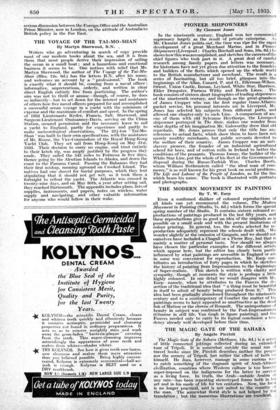PIONEER SHIPOWNERS By Clement Jones
- In the nineteenth century, England won her commercial supremacy largely as the result of private enterprise. As Mr. Clement Jones points-out-the time was ripe for the rapid development of a great Merchant Marine, and in Pioneer Shipowners (Liverpool : Charles Birchall and Sons, 10s. ild.) he shows how this wasacconiplished, and sketches the careers of the chief figures who took part in it. A great deal of careful research among . family papers and letters . was necessary, for historians have not yet given due attention to the founders . and builders of the fleets which opened up the whole world to the British manufacturer and merchant. The -result is a series of fascinating, but all too brief, glimpses into the
beginnings of the 'Allan, Cunard, 'P. and Inman, 0. Ellerman-Wilson,
Orient, Union Castle,. an, Leyland, White Star, Harrison, Elder Dempster, Furness Withy and Rooth Lines. The book consists of sixteen short biographies of leading shipowners
• of the nineteenth century, and though as the -great-grandson of -James -Cropper who ran the first regular trans-Atlantic packet service, his personal interests are in Liverpool, Mr. Jones has selected his subjects from different ports, and allowed_ one chapter only to each Line. - A comparison of any - one of them with old. Sylvanus Heythorpe, the Liverpool shipowner portrayed in The 'Stoic, Makes one wonder from what depths of his imagination Mr. Galsworthy drew that old reprobate. Mr. Jones proves that only the title has any reference to actual, facts, which show.them, to have _been not merely wealthy merchants, but public servants devoted to
the welfare of their country. James Cropper was an anti- slavery pioneer, the founder of an industrial agricultural schciol for boys; and of cotton mills in Ireland to better the conditions of the peasants. Thomas Ismay, the builder of the White Star Line, put the whole of his fleet at the GoVernment's disposal during the Russo-Turkish War. Charles Booth, whom 'William Rothenstein called " the ideal man of com- merce," is as well known for his great book on social problems,
The Life and Labour of the People of London, as for the line which bears his name. The book is illustrated with portraits and photographs. -










































 Previous page
Previous page